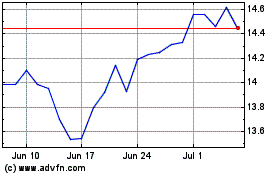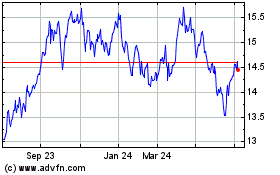MILAN—Eni SpA said Sunday that it made a massive natural-gas
discovery off the coast of Egypt, in what the Italian oil-and-gas
company is calling the largest-ever find in the Mediterranean
Sea.
The gas, estimated at about 30 trillion cubic feet or 5.5
billion barrels of oil equivalent, is in a field about 80 miles off
the Egyptian coast, and is enough to supply the North African
country for decades.
Most of the gas will be used by Egypt, with any excess exported,
perhaps using a liquefied natural gas plant that Eni has not far
from the field.
If the discovery proves to be as big as thought, it will likely
lead to Eni boosting its production targets for the coming years.
The company had been forecasting that it would find 2 billion
barrels of oil equivalent over the next four years, and in the
seven years to 2014 had found 10 billion barrels, less than double
the Egyptian discovery.
Eni has been prospecting for oil and gas in Egypt for over 60
years and is the biggest Western producer in both the country and
all of Africa. The company will use existing facilities, including
offshore platforms, near the new find to keep the development costs
relatively low, Eni Chief Executive Claudio Descalzi said in an
interview. A subsea well also will be used to limit costs.
"This is a confirmation of our strategy of developing
conventional assets in mature areas where we have strong geological
knowledge and where we have synergies," said Mr. Descalzi. "We have
done that very successfully in the past 3 to 4 years."
It will take several months to sort out the development and
production leases, and drilling is expected to begin early next
year, said Mr. Descalzi, who wouldn't say when production might
begin. If drilling starts in early 2016, production would likely
kick off about a year later, based on similar projects.
"We will fast track this project and production will begin as
soon as possible," Mr. Descalzi said. "This discovery is
transformational for Eni and especially for Egypt."
The Leviathan natural gas field off the coast of Israel was the
largest discovery in the Mediterranean before the just-announced
Egyptian find.
While Eni in recent years has generally sold stakes in its big
finds to share the development costs, that is unlikely to happen
with the new Egyptian field because of the relatively low
development costs, said Mr. Descalzi.
Though natural gas is trading near a 2½ -year low, he said that
would have no effect on the decision on when to start pumping the
gas from the Egyptian field.
Eni, through an Egyptian subsidiary, has complete control of the
exploration and will have a 50% stake in the production, with the
rest held by the Egyptian state oil and gas company.
The Egyptian find is one of Eni's largest-ever, though it is
smaller than a natural gas field being developed off the coast of
Mozambique.
After years of turmoil following former President Hosni
Mubarak's ouster, Egypt, which was once a gas exporter to markets
from Asia to South America, was pushed to become an importer over
the past few years after failing to keep pace with its domestic
demand growth.
Such a large gas find could help Egypt, which is dealing with
its worst energy crisis in decades, meet most of its gas demand for
years. It may also have implications for neighboring Israel, which
is looking to export its own deposits to Egypt and Jordan.
"The field is said by ENI to be capable of producing 2.5 to 3
billion cubic feet per day, which would cover most, though not all,
of Egypt's energy gap," said Robin Mills, a nonresident fellow for
energy at the Brookings Doha Center.
"This find probably rules out Israeli gas exports to Egypt, but
won't restore Egypt as a significant exporter unless more is
discovered," he said.
Noble Energy Inc. and Delek Group Ltd., which are developing two
sizable fields in Israeli waters, have been negotiating long-term
contracts to sell gas to companies in Egypt, but the deals have
been delayed by bureaucratic and regulatory hurdles in Israel.
Egypt, one of a handful of Arab countries with normalized
relations with Israel, initially rejected the idea of importing gas
from the country, in fear of protests and violence. But Oil
Minister Sherif told The Wall Street Journal in March that the
country is open to approving the two pending deals to receive gas
from Israel if the price were right and if one of the gas companies
involved dropped legal action against the Egyptian government.
Israel Energy Minister Minister Yuval Steinitz said Sunday in a
statement that the gas find in Egypt "is a painful reminder that
while Israel sleepwalks and dallies with the final approval for the
gas road map, and delays further prospecting, the world is changing
in front of us, including ramifications for export options."
Summer Said contributed to this article.
Write to Eric Sylvers at eric.sylvers@wsj.com
Subscribe to WSJ: http://online.wsj.com?mod=djnwires
(END) Dow Jones Newswires
August 30, 2015 20:55 ET (00:55 GMT)
Copyright (c) 2015 Dow Jones & Company, Inc.
Eni (BIT:ENI)
Historical Stock Chart
From Mar 2024 to Apr 2024

Eni (BIT:ENI)
Historical Stock Chart
From Apr 2023 to Apr 2024
